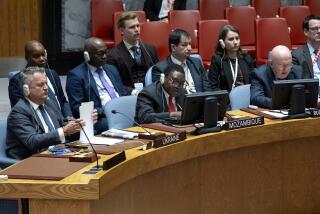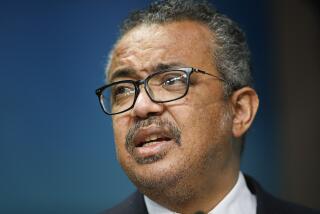General Assembly Formally Elects Egyptian Diplomat as U.N. Chief
- Share via
UNITED NATIONS — Boutros Boutros-Ghali, a 69-year-old Egyptian diplomat with appeal to many religions and regions, was formally elected Tuesday by the General Assembly as the sixth secretary general of the United Nations.
Speaking in Arabic, English and French, Boutros-Ghali, a tall, gray-haired former professor who begins his five-year term Jan. 1, pledged to make “fundamental readjustments” at the United Nations “in response to a world in constant transformation.”
Javier Perez de Cuellar, the secretary general who is retiring after 10 years in office, told the U.N. delegates that he took “pleasure at handing over an organization no longer on the sidelines but one that finds itself at the hub of world affairs.”
Boutros-Ghali had been nominated by the Security Council on Nov. 21 but needed confirmation by the General Assembly, made up of delegates from every member of the United Nations. As expected, the Assembly elected Boutros-Ghali by acclamation. The Assembly has never rejected a Security Council selection for secretary general.
Boutros-Ghali, an Arab Christian with a Jewish wife, was selected by the Security Council largely because of his wide appeal. Although a Middle Eastern diplomat, he satisfied the demand of African governments that the next secretary general come from the African continent. A graduate of the Sorbonne in Paris, he satisfied the French demand that the next secretary general be fluent in French. And, despite his close contacts with many Western diplomats and scholars, he satisfied the Chinese demand that the next secretary general come from the Third World.
In fact, his first address to the General Assembly was clearly an attempt to appeal to many sides on many issues. While he pleased the United States and other critics of U.N. management by pledging to “examine every proposal . . . for streamlining our operations, eliminating what is wasteful or obsolete,” he also tried to reassure U.N. bureaucrats worried about their jobs by promising that “we will work together to revitalize the United Nations.”
More to Read
Sign up for Essential California
The most important California stories and recommendations in your inbox every morning.
You may occasionally receive promotional content from the Los Angeles Times.













